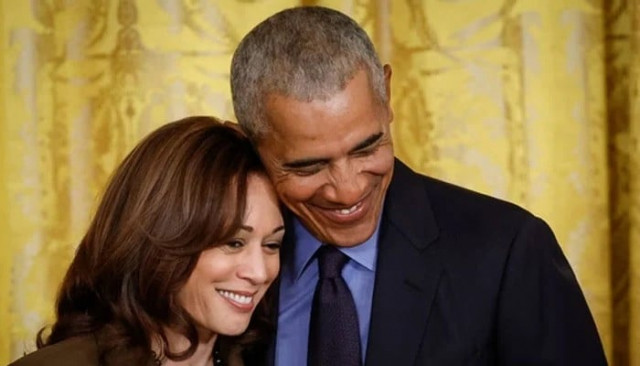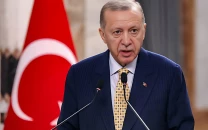Barack Obama raises $4 million for Harris campaign
Obama describes election as moment against what he describes as "radical forces" aiming to take country backward

Former President Barack Obama hosted his first solo fundraiser for Kamala Harris in Los Angeles on Friday, raising $4 million for her presidential campaign.
The event highlighted the election as a pivotal moment against what Obama described as "radical forces" aiming to take the country backward.
Obama’s increased involvement is seen as crucial to energizing grassroots support and appealing to younger voters, especially in a race that could be decided by narrow margins.
He has played an active role in Harris's campaign, leveraging his popularity within the Democratic Party to enhance fundraising efforts.
Next week, both Obama and former Secretary of State Hillary Clinton are scheduled to hold separate fundraising events for Harris in Los Angeles.
Clinton’s event will be a lunch gathering, while Obama’s will take place in the evening.
This marks Clinton’s first high-profile donor event since the convention and Obama’s first official campaign event for Harris, following a speech in Chicago last month.
Harris's campaign has seen significant financial support, reporting approximately $500 million raised since she became the Democratic nominee after Joe Biden stepped aside.
In August alone, her campaign raised an impressive $361 million, further extending her cash advantage over Donald Trump.
The urgency for fundraising is underscored by the competitive nature of the upcoming election, set for November 5.
Harris’s team reported raising $200 million in the first week after she entered the race on July 21, contributing to an overall record fundraising total.
This amount included $310 million raised in July, bringing the combined fundraising total of Harris and Biden before his exit to over $1 billion, marking a historic pace.
Trump's campaign, by comparison, reported raising $138.7 million in July, with a cash reserve of $327 million.
Although Trump's team has shown strong fundraising, Harris’s surge in support and donor enthusiasm—especially among small-dollar contributors—reflects growing momentum as she campaigns across key swing states.
As the election approaches, both Harris and Obama aim to motivate voters by framing the campaign as a battle for the future of the nation. Harris has portrayed herself as the underdog, a strategic move to galvanize her base and maintain engagement among supporters.
In the lead-up to the election, fundraising and voter mobilization efforts will be critical in ensuring that Democratic candidates can effectively compete in what is expected to be a closely contested race.
With Joe Biden unexpectedly dropping out of the race in July and endorsing Harris, the election has evolved into a historic showdown that could either result in Trump regaining the presidency or Harris becoming the first woman president in US history.
Polling data shows that Harris has maintained a slight lead over Trump on the national stage.
A recent Reuters/Ipsos poll conducted after the September 10 debate in Pennsylvania revealed that 53% of respondents believed Harris won the debate, compared to 24% who felt Trump emerged victorious.
However, the poll did not show a shift in overall voter sentiment, with Harris still leading Trump 46% to 45%, the same margin as before the debate.
With early voting already underway in several states, the pressure is mounting for both campaigns to solidify support and maximize their outreach efforts in the final stretch.


1725099588-0/BeFunky-(41)1725099588-0-208x130.webp)
















COMMENTS
Comments are moderated and generally will be posted if they are on-topic and not abusive.
For more information, please see our Comments FAQ